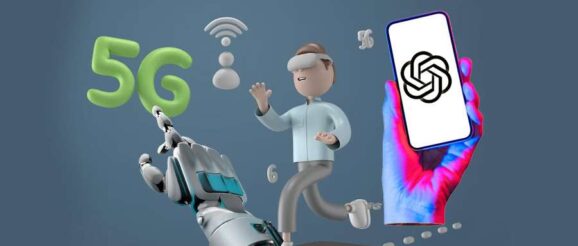Leveraging ChatGPT and AI for 5G Innovation

Advancements in AI-driven communication and connectivity with ChatGPT and the future of 5G
Through various application cases, the fusion of 5G and AI accelerates innovation for enterprises. Organizations are going through a radical change in how they operate due to the introduction of 5G networks and the cognitive capabilities of AI. The enormous potential of 5G and AI for businesses to reshape sectors and provide them with the tools they need to succeed in the digital age is explored in this article. Business operations are revolutionized by the seamless integration of 5G and AI through improved automation, immersive experiences, and powerful data analytics. Join us as we explore the fascinating world of 5G and AI use cases and learn about the countless opportunities they present to companies operating in various industries.
The manufacturing industry is transforming because of the combination of 5G and AI technology, which allows companies to improve their processes and attain previously unheard-of levels of efficiency. To maintain smooth manufacturing operations, firms may use AI and 5G technology to leverage the potential of real-time monitoring and predictive maintenance.
Real-time monitoring enables manufacturers to get insightful knowledge about machine performance, output rates, and resource usage by instantly gathering and analyzing data from numerous sources. Additionally, automated quality control systems driven by 5G and AI help firms produce products consistently of a high caliber. Only the highest-quality items reach the market because AI algorithms can examine data from sensors and cameras to find flaws or anomalies in production.
The financial implications of 5G and AI for the healthcare industry are enormous. The remote monitoring of patients, telemedicine, AI-powered diagnostics, and individualized therapy are the major areas where 5G and AI are having a significant influence. Healthcare professionals may remotely monitor patients’ vital signs, symptoms, and general health without having to see them in person. Real-time data can be delivered effortlessly thanks to 5G networks’ high-speed connectivity, which enables healthcare personnel to monitor patients’ symptoms and react quickly. Personalized healthcare is a further possible commercial use for 5G and AI. AI algorithms can assess a sizable quantity of medical data for diagnosis and individualized care, including patient records, medical pictures, and research publications.
Together, 5G and AI are influencing smart infrastructure development and cities, with significant advantages for enterprises and communities. Intelligent traffic management enables real-time data gathering and analysis by utilizing the high-speed and low-latency capabilities of 5G networks. AI algorithms process this data to improve transportation efficiency, optimize traffic flow, and reduce congestion. The outcome will be a smoother traffic flow and shorter travel times since AI systems can dynamically alter traffic lights, redirect cars, and provide drivers with real-time traffic data. Another area where 5G and AI significantly influence is efficient energy use.
A new age of efficiency, safety, and sustainability is being ushered in by the intersection of 5G and AI in the transportation and logistics sector. Using autonomous cars and drones as commercial tools convincingly illustrate 5G with AI. These cars may interact with one another and the surrounding infrastructure in real time by utilizing the high-speed and low-latency capabilities of 5G networks, enabling flawless coordination and navigation. Autonomous vehicles can scan their surroundings, predict road conditions, and make split-second judgments thanks to AI systems with enhanced perception and decision-making abilities. This increases both safety and efficiency.
A more smooth and effective level of communication will be made possible by AI-driven technologies like ChatGPT as 5G networks are being deployed worldwide. Customer service is one of ChatGPT’s most exciting potential uses in the 5G era. AI-driven chatbots can offer prompt, precise, and individualized support as businesses work to satisfy consumers’ expanding needs. ChatGPT can give real-time replies by utilizing the high-speed and low-latency capabilities of 5G networks, increasing customer satisfaction and lowering the need for human interaction. In addition to streamlining the customer service procedure, organizations can concentrate their scarce resources on other important activities. ChatGPT may be used in various sectors, including customer service, healthcare, education, and entertainment. For example, ChatGPT may give medical personnel rapid access to crucial information in the healthcare industry, allowing them to make better decisions and offer patients more effective care. AI-driven language models in education can help with individualized instruction by providing students with advice and support specific to their needs and skills. ChatGPT may be utilized in the entertainment sector to provide immersive and engaging experiences, such as virtual assistants that can converse with consumers in their natural language.
Additionally, ChatGPT and 5G technology working together can advance the creation of smart cities. City planners may make better-informed choices and improve urban infrastructure using AI-driven language models, which can assist in analyzing and interpreting the massive volumes of data produced by connected devices. This might result in better energy management, traffic control, and general quality of life for city dwellers.
The post Leveraging ChatGPT and AI for 5G Innovation appeared first on Analytics Insight.

